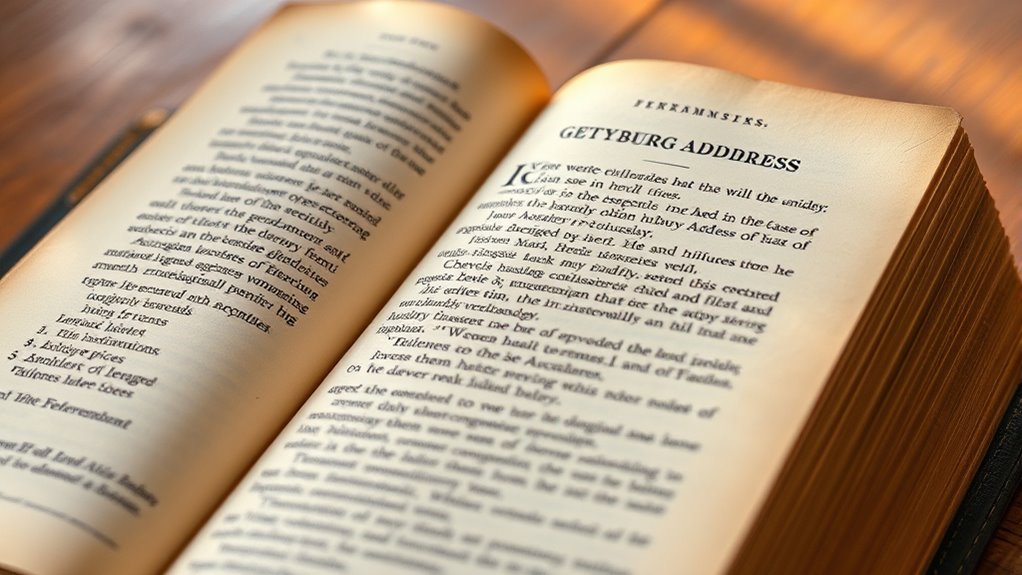Breaking down the Gettysburg Address sentence by sentence reveals how Lincoln opens with a powerful recap of American history, emphasizing the nation’s founding. He then honors fallen soldiers and the sacred ground they fought on. Lincoln affirms the principle that “all men are created equal,” reinforcing core American values. He urges you to dedicate yourself anew to preserving the union and the principles of liberty. To truly understand how each part builds the speech’s impact, keep exploring how these words shape its enduring message.
Key Takeaways
- The opening sentence links the Civil War to American founding principles, emphasizing the nation’s historical roots.
- Lincoln describes the battlefield as sacred ground honoring those who sacrificed their lives.
- He affirms that “all men are created equal,” reinforcing core democratic values amid the conflict.
- Lincoln urges the living to dedicate themselves to finishing the work of the fallen soldiers.
- The speech’s memorable language and themes inspire unity, moral purpose, and ongoing commitment to the nation.

The Gettysburg Address is often regarded as one of the most powerful speeches in American history, yet its brevity can make it seem simple. But if you look closer, you’ll see that every word is carefully chosen, reflecting Lincoln’s mastery of Civil War rhetoric and his distinctive oratory style. Lincoln uses concise, impactful language to evoke emotion and reinforce the importance of the Union’s cause. His speech is a prime example of how a few well-chosen words can carry profound meaning, especially in the context of a nation torn apart.
The Gettysburg Address exemplifies concise, powerful language that elevates sacrifice and unity in American history.
As you analyze each sentence, you’ll notice Lincoln begins by acknowledging the significance of the location—”Four score and seven years ago”—which anchors his message in history. This phrase, a formal and memorable way to say 87 years, connects the present moment to the founding of the nation. It signals that the Civil War is a test of whether the nation, built on principles of equality, can survive. Lincoln’s oratory style here is direct and respectful, establishing a tone that commands attention and reverence.
Moving into the next sentence, he describes the battlefield as hallow, a sacred ground dedicated to those who fought and died. His use of solemn, respectful language exemplifies Civil War rhetoric that seeks to honor sacrifice while inspiring unity. Lincoln emphasizes that this ground is more than dirt; it’s a symbol of national resolve and shared purpose. His words serve to elevate the sacrifices made, urging listeners to see the war as a moral struggle for a higher ideal.
When Lincoln states that “all men are created equal,” he invokes the core principle of American democracy. His straightforward yet powerful phrasing underscores the moral foundation of the Union cause. Here, Lincoln’s oratory style is clear and resolute, reinforcing the importance of equality in a nation divided by conflict. It’s a reminder that the Civil War isn’t just about territory—it’s about preserving the nation’s commitment to liberty and human dignity.
In the final part of this segment, Lincoln calls the living to dedicate themselves anew to the unfinished work of those who fought. His language is both practical and inspiring, urging action rooted in memory and sacrifice. Every phrase is crafted to motivate unity, emphasizing that this isn’t just a memorial but a call to continue the fight for a united nation founded on liberty and equality. By analyzing each sentence, you see how Lincoln’s Civil War rhetoric and oratory style work together to craft a speech that remains powerful and relevant more than a century later.
Additionally, Lincoln’s use of Memorable language helps cement his message in the minds of listeners, ensuring the speech’s enduring impact.
Frequently Asked Questions
What Inspired Abraham Lincoln to Write the Gettysburg Address?
You’re curious about what inspired Lincoln to write the Gettysburg Address. It was born from the Civil War, which challenged the nation’s ideals of equality and unity. Lincoln wanted to honor those who fought and emphasize the importance of preserving a government dedicated to Civil Rights. His speech aimed to inspire Americans to continue working toward a more perfect union, ensuring that “all men are created equal” truly becomes a reality.
How Was the Speech Received by the Public at the Time?
You might be surprised how the public opinion at the time was mixed; some praised Lincoln’s brevity and sincerity, while others felt it was too brief to matter. Yet, its profound words left a lasting mark, shaping the nation’s history. You see, the speech’s emotional power and call for unity earned it a revered place in history, proving that even brief words can have a timeless, impactful legacy.
What Historical Events Influenced the Tone of the Speech?
You’re curious about what shaped the tone of Lincoln’s speech. The Civil War’s brutal realities deeply influenced him, pushing him to emphasize national unity and sacrifice. The ongoing conflict reminded him of the importance of preserving the Union and honoring fallen soldiers. These events made his tone somber yet hopeful, inspiring Americans to reunite and continue fighting for a united nation.
How Does the Gettysburg Address Compare to Other Presidential Speeches?
Think of the Gettysburg Address as a razor-sharp arrow, piercing through the noise of other presidential speeches. You’ll notice its brevity and powerful rhetorical techniques, which make it stand out. Unlike lengthy speeches, Lincoln’s words condense profound meaning into a few lines, creating a lasting impact. This speech’s concise, heartfelt tone sets it apart from others, showing how masterful use of language and brevity can elevate a message to timeless greatness.
What Are Some Common Misconceptions About the Speech’s Meaning?
You might believe the Gettysburg Address is just about honoring fallen soldiers, but interpretation myths often oversimplify its meaning. Some people think it solely emphasizes national unity, ignoring deeper themes like equality and sacrifice. Be aware of historical inaccuracies that can distort its intent. Understanding these misconceptions helps you see how Lincoln’s words challenge you to reflect on freedom and democracy, beyond just commemorating a battle.
Conclusion
Now that you’ve dissected each sentence, the true power of Lincoln’s words starts to resonate. What deeper meaning lies beneath his concise phrases? As you reflect, a lingering question emerges: how do these timeless words continue to shape our understanding of freedom and sacrifice today? The address’s mystery invites you to explore further, revealing secrets that could change your perspective forever. Are you ready to uncover what lies beneath the surface?









